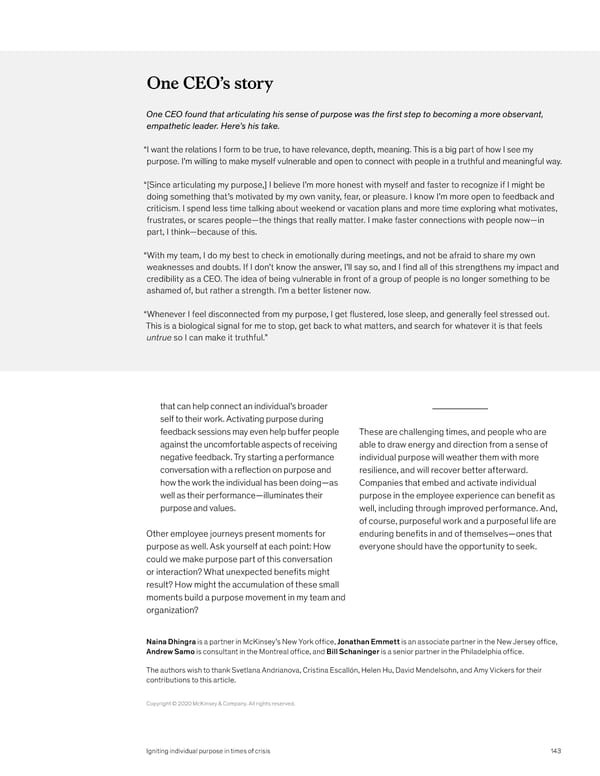One CEO’s story One CEO found that articulating his sense of purpose was the first step to becoming a more observant, empathetic leader. Here’s his take. “I want the relations I form to be true, to have relevance, depth, meaning. This is a big part of how I see my purpose. I’m willing to make myself vulnerable and open to connect with people in a truthful and meaningful way. “[Since articulating my purpose,] I believe I’m more honest with myself and faster to recognize if I might be doing something that’s motivated by my own vanity, fear, or pleasure. I know I’m more open to feedback and criticism. I spend less time talking about weekend or vacation plans and more time exploring what motivates, frustrates, or scares people—the things that really matter. I make faster connections with people now—in part, I think—because of this. “With my team, I do my best to check in emotionally during meetings, and not be afraid to share my own weaknesses and doubts. If I don’t know the answer, I’ll say so, and I find all of this strengthens my impact and credibility as a CEO. The idea of being vulnerable in front of a group of people is no longer something to be ashamed of, but rather a strength. I’m a better listener now. “Whenever I feel disconnected from my purpose, I get flustered, lose sleep, and generally feel stressed out. This is a biological signal for me to stop, get back to what matters, and search for whatever it is that feels untrue so I can make it truthful.” that can help connect an individual’s broader self to their work. Activating purpose during feedback sessions may even help buffer people These are challenging times, and people who are against the uncomfortable aspects of receiving able to draw energy and direction from a sense of negative feedback. Try starting a performance individual purpose will weather them with more conversation with a reflection on purpose and resilience, and will recover better afterward. how the work the individual has been doing—as Companies that embed and activate individual well as their performance—illuminates their purpose in the employee experience can benefit as purpose and values. well, including through improved performance. And, of course, purposeful work and a purposeful life are Other employee journeys present moments for enduring benefits in and of themselves—ones that purpose as well. Ask yourself at each point: How everyone should have the opportunity to seek. could we make purpose part of this conversation or interaction? What unexpected benefits might result? How might the accumulation of these small moments build a purpose movement in my team and organization? Naina Dhingra is a partner in McKinsey’s New York office, Jonathan Emmett is an associate partner in the New Jersey office, Andrew Samo is consultant in the Montreal office, and Bill Schaninger is a senior partner in the Philadelphia office. The authors wish to thank Svetlana Andrianova, Cristina Escallón, Helen Hu, David Mendelsohn, and Amy Vickers for their contributions to this article. Copyright © 2020 McKinsey & Company. All rights reserved. Igniting individual purpose in times of crisis 143
 What Now? Page 144 Page 146
What Now? Page 144 Page 146